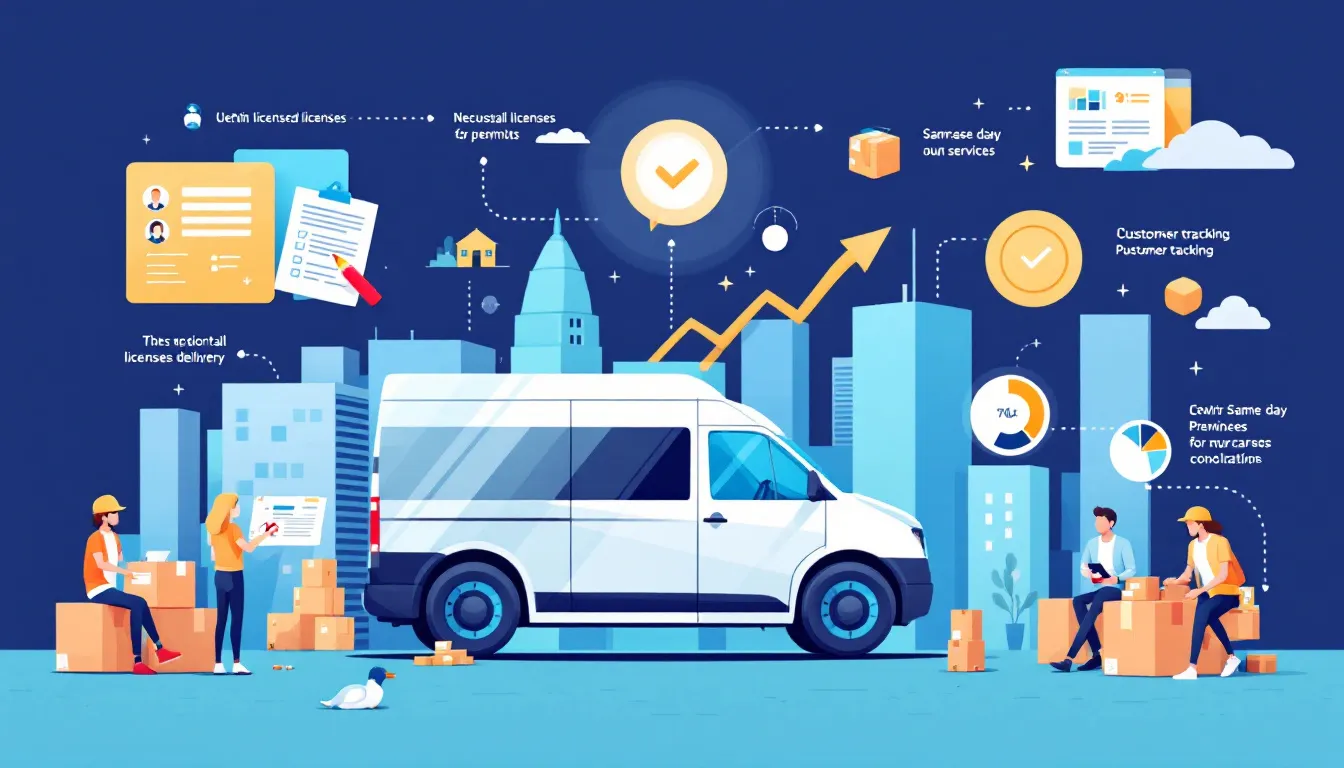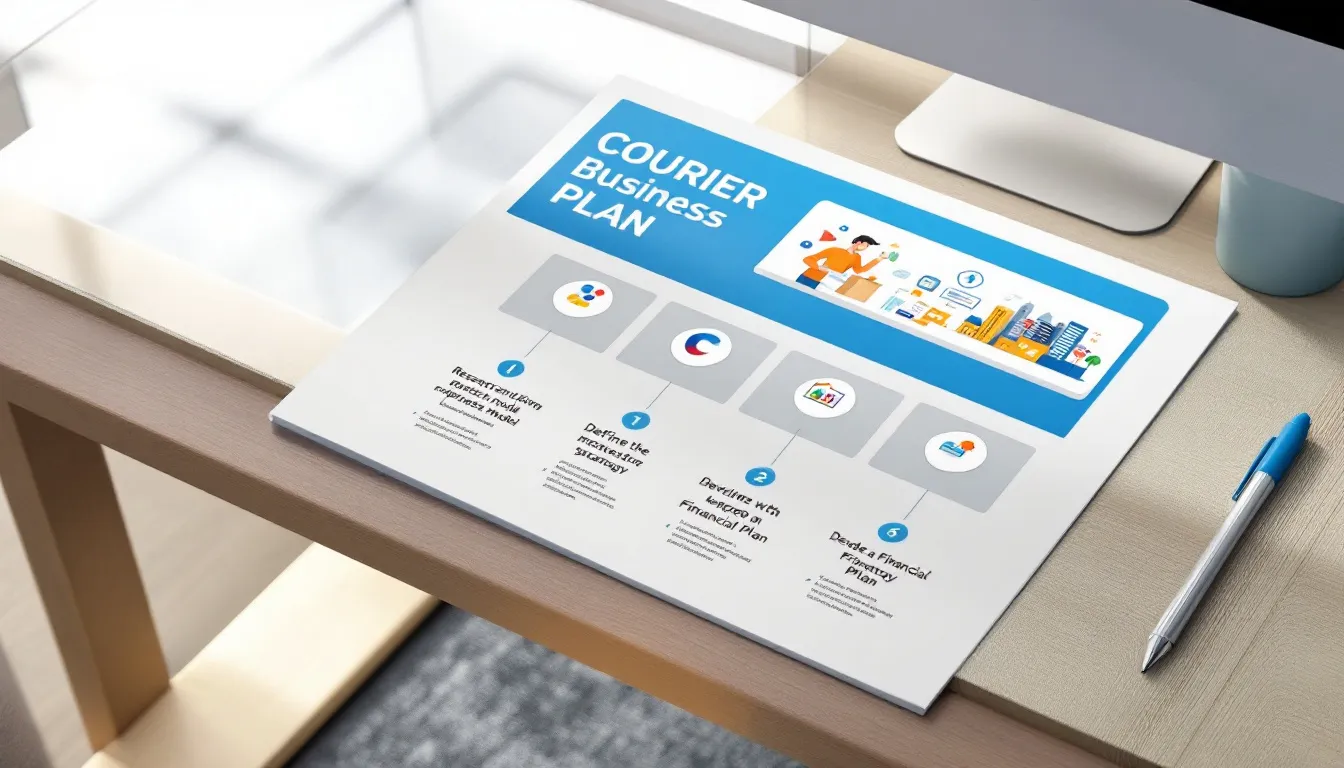How to open Courier Business: Easy steps for success
Wondering how to open a courier business? This guide covers everything you need to know—deciding on your niche, creating a business plan, and meeting legal requirements. Let’s dive into the essentials of how to open a courier company successfully, helping you start your own courier service and capitalize on the growing demand for local deliveries and e-commerce trends.
Key Takeaways
- Identify your niche to tailor your courier services effectively, whether that’s local deliveries, specialized items, or business-to-business logistics.
- Create a detailed business plan that includes market research, financial projections, and a solid marketing strategy to attract clients and investors.
- Prioritize exceptional customer service and efficient operations, leveraging technology for route optimization, communication, and performance monitoring.
Identify Your Courier Business Niche

The first step in establishing a successful courier business startup is to start a local courier business by identifying your niche. This involves understanding the specific needs of your customers and the type of products you plan to deliver for your new courier business. Starting with a local focus can help build a strong customer base and provide a solid foundation for future expansion.
Courier services can vary significantly based on location, type of delivery, and customer expectations. Whether you aim to serve local businesses or specialize in sensitive deliveries, defining your niche will guide your business model and operational strategies.
Let’s delve into different niche options to consider.
Local Courier Services
Focusing on local courier services can be a great way to start, especially if you’re looking to establish a reliable presence in your community. Starting your own local courier business involves careful planning, finding a niche, and implementing effective marketing strategies to meet the needs of local customers. Speed is a critical factor for the target market in the courier business, making same-day and next-day deliveries attractive options. Understanding your target market and offering same-day delivery options will help you stand out among local businesses.
A hybrid courier model can handle deliveries for both businesses and homes, including next-day and same-day deliveries. This model increases operational overhead but can be very profitable if managed correctly. Efficient route planning is essential for scalability and profitability, reducing fuel costs and improving delivery times.
Same-day deliveries can be managed effectively through batch pickups with centralized sorting and later delivery. This approach ensures that packages are deliver packages promptly, meeting customer expectations for speedy service. Providing exceptional customer service helps build a loyal customer base that values reliability and efficiency.
Offering scheduled deliveries alongside same-day services can accommodate various customer needs, enhancing your service offerings and attracting a broader client base.
Specialized Delivery Services
Specialized delivery services cater to unique community needs and handle sensitive items, such as medical supplies, hazardous materials, and climate-controlled products. By focusing on these niches, you can differentiate your courier business and command higher prices.
Networking through local business groups can enhance visibility and credibility for your courier service business. Collaborating with local businesses creates mutual benefits and expands your customer base. Specialized delivery services often require specific equipment and training, but the investment can pay off with higher margins and customer loyalty. Additionally, partnering with courier companies can further streamline operations and improve service offerings.
Specialized delivery services cater to unique community needs, setting you apart from competitors and making a significant local impact. Whether you’re delivering medical supplies or other sensitive items, providing exceptional customer service is key to building trust and repeat business.
Business-to-Business Deliveries
Business-to-business (B2B) deliveries offer significant opportunities for higher margins and stable revenue. Deliveries of sensitive documents and perishable goods can command premium pricing due to their critical nature. In B2B logistics, on-demand pickup and delivery services for sensitive documents can come with high costs. These services are often considered premium due to their specialized nature.
B2B deliveries often involve scheduled pickups and deliveries tailored to meet business needs. This predictability allows for efficient route planning and cost management. Additionally, business clients typically value reliability and consistency, making it essential to maintain a high level of service.
By focusing on B2B deliveries, you can tap into a lucrative market with larger margin potential compared to regular delivery services. Establishing strong relationships with business clients will ensure steady demand and long-term success.
Develop a Comprehensive Business Plan

A comprehensive business plan is crucial for attracting investors, guiding your decisions, and staying focused on your objectives. For a courier service company, it is essential for defining the company's goals and outlining implementation strategies.
It should include:
- A detailed description of your delivery service
- Target market
- Business model
- Pricing
Conducting market research is essential. It will validate your business idea and aid in creating an effective marketing plan.
Identifying and understanding your target audience helps assess if your services meet their needs. Estimating financials should consider startup costs, ongoing expenses, and potential revenues for realistic projections. Regular assessment of business strategies will enable timely adjustments in response to market changes and customer preferences.
Let’s break down the key components of a solid business plan.
Define Your Business Model
Defining your business model is essential for ensuring profitability and sustainability. Choosing the right structure from the outset will impact your long-term success. For instance, if you are looking to start your own courier business, opting for a van- or truck-based delivery service can facilitate a quick launch and generate profits early on.
Different business structures, such as sole proprietorships, partnerships, or limited liability corporations, can influence tax obligations and personal liability. A partnership model offers shared ownership but may involve joint liabilities unless structured correctly. Once a basic business model is established, it’s advisable to explore and test additional ideas as the business grows.
Choosing the right business structure and model will significantly impact the viability of your business plan and your ability to attract investors.
Financial Planning
Financial planning is a critical component of your business plan. Unique services offered by a courier can significantly affect pricing strategies and overall startup costs. For example, on-demand pickups for sensitive items can allow couriers to charge premium prices, increasing startup investment requirements.
Deliveries of perishable goods often come with higher pricing due to their time-sensitive nature, affecting initial cost structures. It’s also important to consider various types of insurance, including business insurance for employees and coverage for business equipment, as ongoing expenses.
Using larger vehicles for courier deliveries can achieve economies of scale, aiding in managing cash flow better by lowering the cost per delivery. Leasing vans or utilizing used cargo vans can help reduce fiscal strain and secure funding more efficiently during the startup phase.
Marketing Strategy
Developing an effective marketing strategy involves identifying your target audience and determining the best promotional channels. A successful marketing plan will enhance brand visibility and attract clients. Creating a compelling narrative about your services can make your brand more memorable to potential clients.
Using traditional advertising methods alongside digital strategies can enhance overall market reach. Combining both approaches will ensure your marketing efforts are comprehensive and effective. A robust marketing strategy allows you to reach your target market more effectively and build a strong customer base.
Fulfill Legal Requirements
Fulfilling legal requirements is a critical step in starting your courier business. Selecting the appropriate legal structure can affect your personal liability and tax obligations.
Ensure that you meet all regulatory requirements and obtain the necessary permits and business license to operate legally.
Select Delivery Vehicles
Choosing the right delivery vehicles is crucial for operational efficiency. Cargo vans are ideal for their capacity and efficiency, while bikes are suitable for dense urban areas due to their low cost and environmental benefits, despite limitations in transport capacity and service area.
Consider the scale of your delivery operations and choose vehicles that align with the type of deliveries and the service area. This decision will impact your overall efficiency and cost management.
Essential Equipment
Equipping your courier business with necessary tools is vital for operational efficiency and customer satisfaction. Essential equipment includes GPS-enabled devices for navigation efficiency and tools like dollies or hand trucks for effective parcel deliveries.
The right equipment ensures that deliveries are completed promptly and safely, contributing to a positive customer experience.
Implement Efficient Operations
Implementing efficient operations is key to minimizing costs and risks while enhancing customer experience. Setting up processes and systems should be prioritized from day one to ensure smooth operations.
Route Optimization
Efficient route planning is crucial for profit maximization in local courier services. Automated route optimization software helps dispatchers manage deliveries more effectively and can lead to substantial savings in fuel costs. Incorporating route optimization software improves delivery efficiency by reducing unnecessary stops and improving delivery times.
Optimized routes contribute to reduced fuel usage and lower operational costs for courier businesses. This technology is essential for maintaining a competitive edge in the delivery industry.
Customer Communication
Effective customer communication builds trust and satisfaction. Real-time tracking systems enhance delivery accuracy and customer satisfaction, while digital proof of delivery maintains accountability and transparency.
Notifications and tracking improve the customer experience, encouraging repeat business and positive reviews.
Prioritize Exceptional Customer Service

Exceptional customer service is the cornerstone of a successful courier business. Building trust requires a consistent, professional brand. Social media platforms can be used for real-time customer service and prompt inquiry responses. Making current customers happy increases referrals and enhances business growth.
Let’s explore how to train your staff and gather feedback effectively.
Train Your Staff
Training staff in effective customer service techniques can significantly enhance your courier business’s reputation. New customers often judge a courier business based on the performance of their first delivery. Regularly reviewing team performance data ensures quality service and identifies areas for improvement.
Investing in staff training will help provide exceptional customer service, building a loyal customer base and encouraging repeat business.
Gather Feedback
Customer feedback is crucial for identifying service improvement opportunities and optimizing customer satisfaction. Soliciting feedback from customers helps improve service quality.
Fleet management software automates delivery updates, simplifying customer feedback management.
Market Your Courier Business
Marketing is essential for building a customer base in the courier business. Recognizing the presence of existing courier service businesses is crucial to effectively carve out a niche and attract potential customers. A strong online presence helps in reaching a wider audience and enhances brand credibility.
Let’s dive into digital marketing and local advertising strategies.
Digital Marketing
Digital marketing is a powerful tool for attracting potential customers and increasing your courier business’s visibility. Implementing effective search engine optimization (SEO) techniques is crucial for driving traffic to your website. By optimizing your site for relevant keywords and using high-quality images and videos, you can enhance customer engagement and build trust.
Incorporating multimedia content into your marketing efforts can attract new customers effectively. Social media platforms are excellent for promoting your services, engaging with your audience, and building brand awareness. Regularly posting updates, sharing customer testimonials, and running targeted ads can significantly boost your online presence.
Combining online marketing strategies with a well-planned marketing approach helps you reach your target market more effectively and grow your customer base.
Local Advertising
Local advertising increases visibility and attracts clients within your community. Printed materials like brochures and flyers economically promote your courier business and can be distributed in strategic locations to enhance brand presence.
Consider combining printed advertising with other marketing techniques to maximize your outreach and effectiveness. Being visible in your local area will help build a loyal customer base and establish your business as a reliable service provider.
Monitor and Adapt Your Business Strategy
The courier industry is booming due to the rapid growth of e-commerce since the pandemic. To stay competitive, it’s essential to continuously monitor and adapt your business strategy. The growing demand for delivery services across various industries makes it crucial to stay agile and responsive to market changes.
Using technology for courier management can significantly enhance operational efficiency. Key metrics to track include gross margins, cost per delivery, and on-time delivery rates. Regularly assessing these metrics will help you identify areas for improvement and ensure your business remains profitable.
Analyze Performance Metrics
Key performance indicators (KPIs) like on-time delivery rates and order accuracy are essential for evaluating delivery success and provide valuable operational insights. Regular assessments of team performance metrics can help ensure the quality of service provided by delivery staff.
Embrace Technology
Adopting digital tools and software solutions is essential for enhancing operational efficiency and staying competitive in the courier industry. Utilizing real-time data analytics enhances decision-making and allows businesses to adapt quickly to unexpected delivery challenges.
Summary
Starting a courier business requires careful planning, dedication, and a focus on customer satisfaction. By identifying your niche, developing a comprehensive business plan, fulfilling legal requirements, establishing an online presence, implementing efficient operations, prioritizing exceptional customer service, and effectively marketing your business, you can build a successful courier service.
Remember to continuously monitor and adapt your business strategy to stay ahead in the competitive delivery industry. With the right approach and a commitment to excellence, your courier business can thrive.
Frequently Asked Questions
What is the first step in starting a courier business?
The first step in starting a courier business is to identify your niche, so you know who your customers are and what products you'll be delivering. Nail this down, and you're already on your way!
How important is a business plan for a courier business startup?
A solid business plan is key for your courier startup—it helps attract investors, keeps you on track, and focuses your goals. Don't skip it!
What types of delivery vehicles should I consider for my courier business?
You should definitely think about cargo vans for larger deliveries, but bikes and motorbikes are great for quick, smaller jobs. Choose based on your delivery needs and area!
How can I effectively market my courier business?
To effectively market your courier business, combine digital marketing strategies like SEO and social media with local advertising methods such as brochures and flyers. This approach will boost your visibility and help attract more clients.
Why is customer feedback important for a courier business?
Customer feedback is key for a courier business because it helps pinpoint where services can improve and keeps customers happy. Plus, it drives ongoing enhancements to your operations.